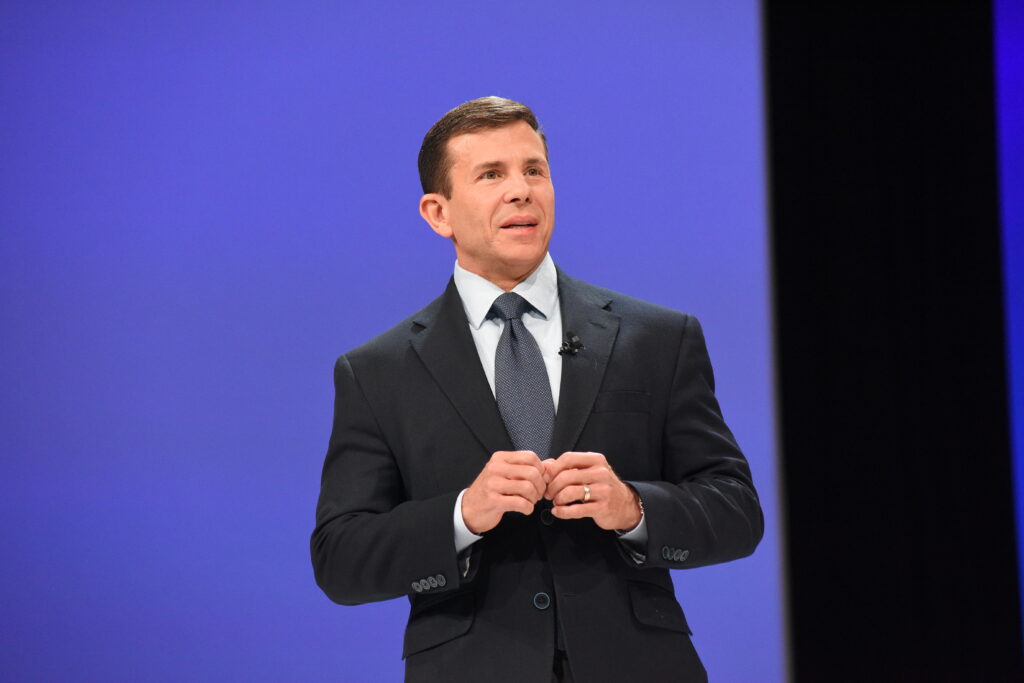The wait is finally over as the Biotechnology Innovation Organization (BIO) taps John F. Crowley, a longtime leader and tireless patient advocate in the biotech industry, to fill the role of the organization’s new President & CEO.
“It’s tremendously exciting that John Crowley has agreed to step up and become the next CEO of BIO,” says Dr. Ted W. Love, BIO’s Board Chair. “It’s a tremendous thing for me on a personal level because I’ve known John for the last decade, and he’s an exceptional leader. He cares tremendously about our industry and what we do, and he’s got great relationships both within our industry, as well as in Washington, D.C., where much of his advocacy occurs, so he really is the right person at the right time to lead this organization.”
“I’m just thrilled that it’s going to be John,” adds Rachel King, who has served as BIO’s interim CEO since October 2022. “I think he’s going to be great for the organization and great for the industry.”
A clear candidate
“We’ve been working toward identifying a new CEO ever since I took the interim role,” says King. “The process of looking for a new CEO has been a really extensive, thoughtful, and engaged process that involved getting input from people within the organization, people on the board, people outside of BIO, and really trying to understand what we were looking for in the CEO role.”
Crowley filling the role of CEO just made sense. A member of the BIO Board for over a decade, he has built strong relationships with BIO Board members, companies, and staff. Crowley’s resume is also incredibly impressive.
He immersed himself in healthcare research early in his career at Bristol-Myers Squibb and later left the company to start Novazyme Pharmaceuticals, which was eventually acquired by the Genzyme Corporation, the world’s third-largest biotechnology company at the time. At Genzyme, Crowley led as senior vice president and was in charge of Genzyme’s global Pompe program (more on his ties to Pompe disease later). Crowley eventually moved on from Genzyme to become the founding president and CEO of Orexigen Therapeutics in 2003. A year later he moved on to join Amicus Therapeutics, where he eventually took up the role as CEO in 2005.
Crowley also served in the United States Navy Reserve as an intelligence officer, working at the Center for Naval Intelligence for a six-month tour in Virginia in 2007.
Crowley has also established himself as a fixture on the Hill as a leader and trusted voice in the healthcare industry, often speaking on behalf of BIO. He was recently on Capitol Hill on September 20 about drug price controls.
Letter by letter, the writing was on the wall and spelling only one name: John Crowley.
“I got to know John more after he reached out to me about 13 years ago when he asked me to join the Amicus board of directors,” recalls Dr. Love. “And I was obviously immediately impressed with John’s personality, but also his track record of leadership and his dedication to his family, as well as to our industry, so I ultimately agreed to join the board, which I served on for almost a decade. My respect and admiration for John, as well as how he leads and how it’s all about the patient, just grew and grew.”
But to understand why Crowley is so tailor-made for the BIO CEO role, it is key to first understand his history in the biotech industry.
For Crowley, biotech innovation is personal

The year is 1998 and Crowley and his wife just received crushing news. Their 15-month-old daughter, Megan, had just been diagnosed with a little-known genetic neuromuscular disease – Pompe disease – that meant her heart was failing rapidly. She’d be given only six months to live.
Five months later, Crowley’s youngest son, Patrick, was also diagnosed with the same disease.
Crowley found himself in a race against the clock to save his children and change the lives of children globally who had been diagnosed with Pompe disease. He lost no time becoming both a specialist in the disease, as well as one of the most talented and voracious biotech fundraisers in the industry.
The key element to solving the problem of Pompe, Crowley understood, was that to be successful, he would have to connect the financial element of the innovation puzzle while finding, supporting, and working with a global web of specialists to help crack the code of a puzzle affecting about 5,000 patients in the developed world.
He was working against unimaginable odds: a profoundly rare disease, a ticking clock, and creating a business that could survive in one of the riskiest investment markets in the world. And with all these factors at play, Crowley still had to make sure that he developed drugs that worked, which in and of itself proves to be a nearly insurmountable task for 90 percent of companies/drugs.
And he did it.
Now, Crowley has realized that BIO is the natural next step in his development as one of the most impactful leaders in the biotech industry.
“Becoming CEO at BIO was a natural evolution of my career,” Crowley explains. “At Amicus, we got to an inflection point that enabled me to step down as CEO after 17 and a half years in the summer of 2022 and hand the reins over to Bradley Campbell. I remained as the executive chairman, but I stepped back from CEO and importantly, at the end of September, we got our Pompe drug approved, which was immensely important to patients and to the company. That, together with my increased responsibilities and role at BIO, against the backdrop of the policy, world, and environment that we’re working dealing with, naturally led to me moving into the CEO role at BIO. I’m very much looking forward to getting started.”

Driving patient-first medicine
If the beginning of Crowley’s career was defined by his obsessive need to find and fund treatment and cures for patients in the rare disease space, his time at BIO will be spent making sure that every patient has unfettered access to the treatments they need to live well.
“It’s going to be critical for BIO to be extraordinarily patient-focused on the health side,” explains Crowley. “Everything we do has to be patient first.”
Crowley has been a long-time fixture on the Hill, often representing BIO, speaking about the needs of patients, as well as industry, to make sure innovation can happen quickly and effectively with full access to patients. This often means having the hard conversations that, at times, point out government missteps, as was the recent case when Crowley spoke at the hearing, “How the IRA’s Price Setting Scheme Means Fewer Cures for Patients,” at the House Energy & Commerce Oversight and Investigations Subcommittee.
“We need to break down barriers, encourage massive private capital flows to fund biotech entrepreneurs (and) incentivize our largest biopharmaceuticals companies to invest in rare disease programs,” Crowley testified. “We are instead now facing a massive headwind brought about by an ill-conceived drug control pricing law with consequences—some intended, some unintended—that are instead curtailing funding, further closing avenues of research and, tragically, taking away hope for many who are most in need.”

Even more recently, Crowley was energized by the work BIO did connecting healthcare leaders during their Patient and Health Advocacy Summit in October.
“I was really struck by the fact that not only were there hundreds of patient advocates working in areas like rare disease, but there were also people well beyond rare disease, people representing something as broad-based as celiac disease, Parkinson’s research, and other areas that I hadn’t spoken to as frequently,” says Crowley.
“The quality of the conversations BIO promoted at their events is also noteworthy,” he continues. “Promoting deeper conversations across the disease spectrum is exactly what we need to be doing at BIO. We have to put patients at the center of our conversations, advance the best medicines and therapies possible, and ensure universal access to drugs and therapies. And BIO has a unique voice in advocating here.”
As Crowley prepares for his new role, he is thinking deeply about how the industry relates itself to the outside world, both in policy, the patient advocacy community, and with patients and providers.
“We’re going to be more successful educating people if we do it through storytelling,” says Crowley. “We need to unleash the entrepreneurial spirit for the coming age of biotech. And we need to talk about all of our member companies—the big companies, as well as those who are startups. There are so many great stories of triumph and tribulation–mostly tribulation–when it comes to what it takes to advance our technologies.”
“One of the things that I’ve said publicly is that I’m very excited about how BIO is changing the narrative of our industry,” says Dr. Love. “John is an outstanding person to make it very clear that this industry is about innovation, and works to protect us and to make us more secure in the world—from biodefense to medical therapies. John’s personal story of building a biotech company to save the lives of his children is really very relevant because that’s what our industry stands for.”
“When you ask people, ‘What is biotechnology?’ I think they’d struggle to define it,” Crowley goes on to explain. “I think overall, the public has a very varied and probably generally pretty superficial idea of who we are and what we do. And we need to talk about that. We need to be more intentional about what we do to make the medicines that eliminate or alleviate the scourge of disease. We also need to be more intentional about explaining everything we do in the agricultural world, as well as the technology we are developing to address the climate crisis. Biotechnology is a vibrant part of our economy, but it’s also an instrumental element of our national security. We’re going to be talking a lot about that in the coming years.”
BIO’s new chapter
“John is someone who has come out of our industry and deeply understands what our industry needs,” concludes King. “He is someone who has lived through what company leaders live through. His expertise is not theoretical, it’s lived and it’s practical.”
“I think we have to start with the big picture,” Crowley muses. “Remember, biotechnology as an industry is less than 50 years old—that’s still very young. What we need to do is to help capture the truest narrative of who we are in biotech.”
“We have to advocate for policies that will advance biotechnology to feed, fuel, and heal the world,” Crowley continues. “And that’s our environmental, agricultural, industrial, and life sciences-based technologies. But we also need to remove all the barriers to innovation and access.”
Naming these barriers so we can address them is the next step.
“What is hindering patients from getting access—both in regard to knowledge and the actual ability to acquire their medicines? We need to make sure nobody ever goes without their medicines, whether it’s due to out-of-pocket costs or other barriers,” says Crowley. “We’re going to be able to address those issues by working hand in hand with all of our members, along with the BIO team in Washington, our state affiliates, and all of our partners. We need to educate the public about what biotechnology actually is. And we need to explain to them what our mission is, and what we do.”
For Crowley and BIO, the sky has to be the limit. It is what patients need and what the world deserves.
“There’s nothing in the laws of nature that says we can’t cure any disease or overcome any obstacle—only the limits on what we’re willing to pursue as a society,” asserts Crowley. “I am going to work to bring the purpose, optimism, and passion to BIO that it deserves because what we do is just too important not to.”
Read about John Crowley’s new role in the Wall Street Journal.




